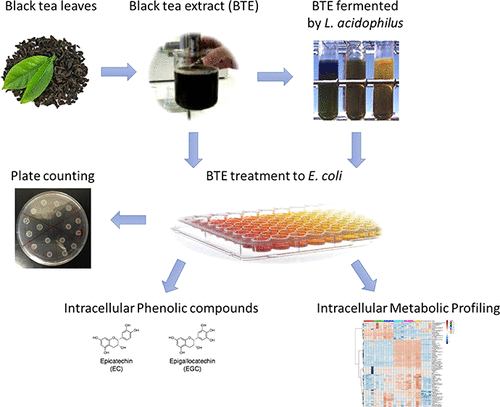当前位置:
X-MOL 学术
›
J. Agric. Food Chem.
›
论文详情
Our official English website, www.x-mol.net, welcomes your
feedback! (Note: you will need to create a separate account there.)
Metabolomics Study Reveals Enhanced Inhibition and Metabolic Dysregulation in Escherichia coli Induced by Lactobacillus acidophilus-Fermented Black Tea Extract
Journal of Agricultural and Food Chemistry ( IF 5.7 ) Pub Date : 2018-02-01 00:00:00 , DOI: 10.1021/acs.jafc.7b04752 Kundi Yang 1 , Matthew L. Duley 1 , Jiangjiang Zhu 1
Journal of Agricultural and Food Chemistry ( IF 5.7 ) Pub Date : 2018-02-01 00:00:00 , DOI: 10.1021/acs.jafc.7b04752 Kundi Yang 1 , Matthew L. Duley 1 , Jiangjiang Zhu 1
Affiliation

|
This study examined the ability of Lactobacillus acidophilus (LA) to ferment black tea extract (BTE) and the enhancement of Escherichia coli cellular uptake of phenolic compounds when these bacteria were incubated with fermented BTE. The inhibitory effects of BTE to E. coli bacteria with and without fermentation were compared. Several intracellular phenolic compounds as well as metabolic profiles of E. coli with and without treatments were also determined using a high-performance liquid chromatography–tandem mass spectrometry-based approach. Our results showed that of three concentrations from the non-fermented BTE treatment, only the extract from the 25 mg/mL tea leaves solution could inhibit E. coli survival, while LA-fermented BTE extract from 5, 10, and 25 mg/mL tea leaves solutions all inhibited E. coli growth significantly. Intracellular concentrations of (+)-catechin-3-gallate/(−)-epicatechin-3-gallate and (+)-catechin/(−)-epicatechin were significantly higher when E. coli was treated with fermented BTE in comparison to non-fermented BTE. Scanning electron microscopy images indicated that the intracellular phenolic compounds inhibited E. coli growth by increasing endogenous oxidative stress. Metabolic profiles of E. coli were also investigated to understand their metabolic response when treated with BTE, and significant metabolic changes of E. coli were observed. Metabolic profile data were further analyzed using partial least squares discriminant analysis to distinguish the fermented BTE treatment group from the control group and the non-fermented BTE treatment group. The results indicated a large-scale E. coli metabolic dysregulation induced by the fermented BTE. Our findings showed that LA fermentation can be an efficient approach to enhance phenolic inhibition of bacterial cells through increased endogenous oxidative stress and dysregulated metabolic activities.
中文翻译:

代谢组学研究揭示了由嗜酸乳杆菌发酵的红茶提取物诱导的大肠杆菌的增强抑制作用和代谢异常。
这项研究检查了嗜酸乳杆菌(LA)发酵红茶提取物(BTE)的能力,以及当这些细菌与发酵BTE孵育时大肠杆菌对酚类化合物细胞摄取的增强作用。比较了BTE在有和没有发酵条件下对大肠杆菌的抑制作用。还使用高效液相色谱-串联质谱法确定了几种细胞内酚类化合物以及经过处理和未经处理的大肠杆菌的代谢谱。我们的结果表明,在未经发酵的BTE处理的三种浓度中,只有25 mg / mL茶叶溶液中的提取物才能抑制大肠杆菌从5、10和25 mg / mL茶叶溶液中的LA发酵的BTE提取物可以显着抑制大肠杆菌的生长。当用发酵的BTE处理大肠杆菌时,(+)-儿茶素-3-没食子酸酯/(-)-表儿茶素-3-没食子酸酯和(+)-儿茶素/(-)-表儿茶素的细胞内浓度明显高于未发酵的BTE发酵的BTE。扫描电子显微镜图像表明,细胞内酚类化合物通过增加内源性氧化应激来抑制大肠杆菌的生长。还对大肠杆菌的代谢特征进行了研究,以了解其在用BTE处理后的代谢反应以及大肠杆菌的显着代谢变化被观察。使用偏最小二乘判别分析进一步分析代谢谱数据,以将发酵BTE治疗组与对照组和非发酵BTE治疗组区分开。结果表明,发酵的BTE引起了大规模的大肠杆菌代谢失调。我们的发现表明,LA发酵可以通过增加内源性氧化应激和代谢活性失调来增强细菌细胞对酚类的抑制作用。
更新日期:2018-02-01
中文翻译:

代谢组学研究揭示了由嗜酸乳杆菌发酵的红茶提取物诱导的大肠杆菌的增强抑制作用和代谢异常。
这项研究检查了嗜酸乳杆菌(LA)发酵红茶提取物(BTE)的能力,以及当这些细菌与发酵BTE孵育时大肠杆菌对酚类化合物细胞摄取的增强作用。比较了BTE在有和没有发酵条件下对大肠杆菌的抑制作用。还使用高效液相色谱-串联质谱法确定了几种细胞内酚类化合物以及经过处理和未经处理的大肠杆菌的代谢谱。我们的结果表明,在未经发酵的BTE处理的三种浓度中,只有25 mg / mL茶叶溶液中的提取物才能抑制大肠杆菌从5、10和25 mg / mL茶叶溶液中的LA发酵的BTE提取物可以显着抑制大肠杆菌的生长。当用发酵的BTE处理大肠杆菌时,(+)-儿茶素-3-没食子酸酯/(-)-表儿茶素-3-没食子酸酯和(+)-儿茶素/(-)-表儿茶素的细胞内浓度明显高于未发酵的BTE发酵的BTE。扫描电子显微镜图像表明,细胞内酚类化合物通过增加内源性氧化应激来抑制大肠杆菌的生长。还对大肠杆菌的代谢特征进行了研究,以了解其在用BTE处理后的代谢反应以及大肠杆菌的显着代谢变化被观察。使用偏最小二乘判别分析进一步分析代谢谱数据,以将发酵BTE治疗组与对照组和非发酵BTE治疗组区分开。结果表明,发酵的BTE引起了大规模的大肠杆菌代谢失调。我们的发现表明,LA发酵可以通过增加内源性氧化应激和代谢活性失调来增强细菌细胞对酚类的抑制作用。











































 京公网安备 11010802027423号
京公网安备 11010802027423号